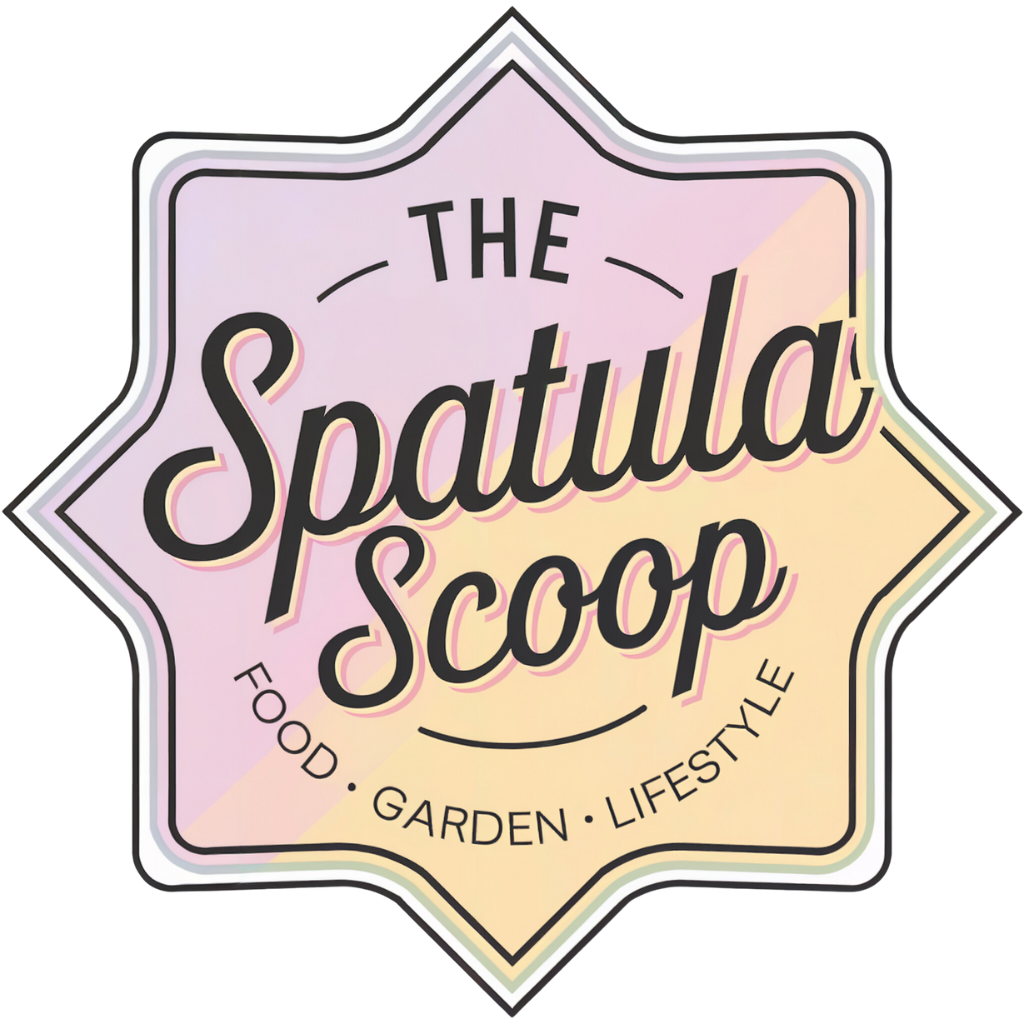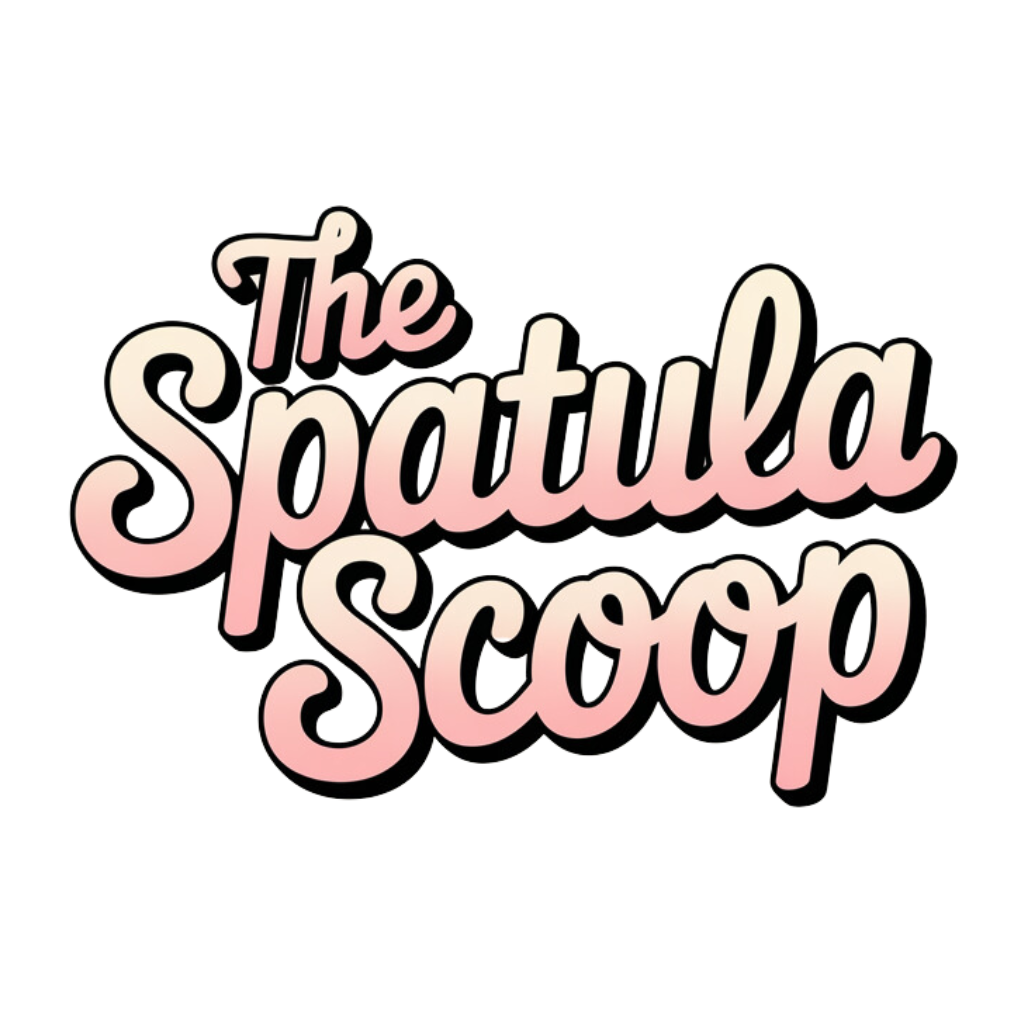Is It Safe to Eat Coffee Beans
Coffee beans are generally safe to eat in moderation, offering a concentrated dose of caffeine and antioxidants. You'll get about 6 mg of caffeine per bean, compared to 95 mg in a cup of brewed coffee. Eating beans provides potential health benefits, including improved blood sugar control and reduced inflammation. However, be cautious of side effects like jitters, anxiety, and digestive discomfort. Limit your intake to 20-30 beans per day, equivalent to 400 mg of caffeine. Raw beans are harder to digest, so opt for roasted varieties. While coffee beans can be a nutrient-dense snack, it's essential to monitor your body's response and adjust consumption accordingly. Exploring further will reveal more about this unique way to enjoy coffee's benefits.
This post may contain affiliate links. If you make a purchase through these links, I may earn a commission at no additional cost to you. Additionally, portions of this post may be generated using artificial intelligence (AI) technology. While we strive for accuracy, please be aware that AI-generated content may not always be perfect and should be fact-checked when necessary.
The Spatula Scoops
- Eating coffee beans is generally safe when consumed in moderation, with a recommended limit of 20-30 beans per day.
- Coffee beans provide concentrated antioxidants and nutrients, potentially offering health benefits like improved blood sugar control.
- Consuming whole beans may lead to more intense caffeine effects compared to drinking brewed coffee.
- Excessive consumption can cause side effects like jitters, anxiety, digestive discomfort, and sleep disturbances.
- Raw coffee beans may be harder to digest, while roasted beans are easier to consume and less likely to cause stomach upset.
Nutritional Profile of Coffee Beans
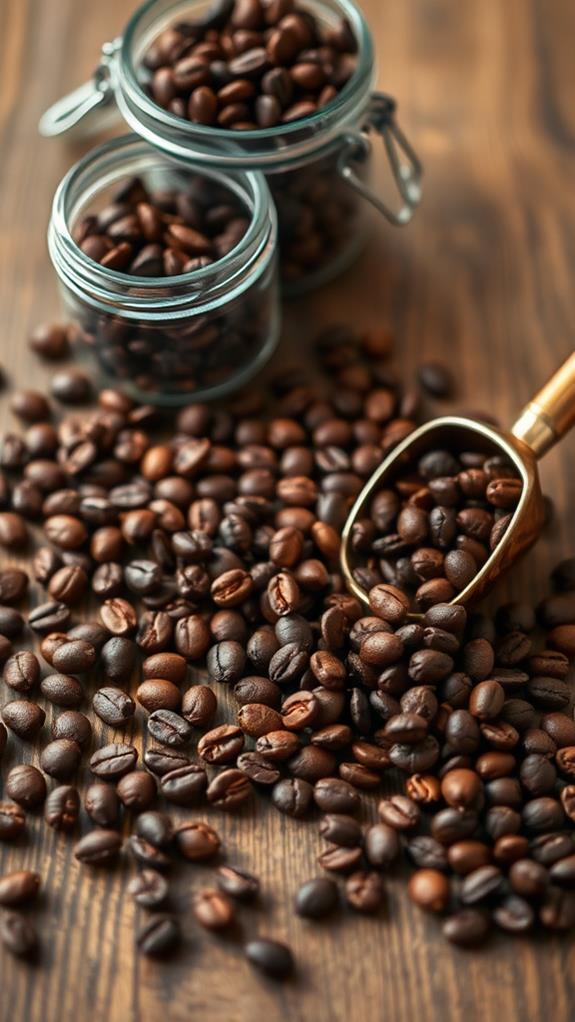
Coffee beans pack a nutritional punch beyond their caffeine content. They're rich in antioxidants, particularly chlorogenic acid, which may help reduce inflammation and lower your risk of chronic diseases. Green coffee beans, which are unroasted, contain even higher levels of chlorogenic acid and offer unique health benefits like improved blood sugar control and metabolism. You'll also find a good amount of fiber in coffee beans, supporting digestive health and potentially aiding in weight management.
These beans contain essential minerals like magnesium and potassium, which play pivotal roles in muscle function and heart health. They're also a source of B vitamins, including riboflavin and pantothenic acid, which help your body convert food into energy. It's worth noting that coffee beans are relatively low in calories, making them a nutrient-dense snack option.
However, it's important to remember that eating coffee beans provides a more concentrated dose of caffeine than drinking brewed coffee. This can lead to increased alertness but also potential side effects like jitters or sleep disturbances if consumed in excess. Additionally, the oils in coffee beans contain diterpenes, compounds that may slightly raise cholesterol levels when consumed in large quantities. As with any food, moderation is key when incorporating coffee beans into your diet.
Caffeine Content and Effects
When you eat coffee beans, you're consuming a more concentrated dose of caffeine compared to drinking brewed coffee. A single coffee bean contains about 6 mg of caffeine, while an average cup of brewed coffee has around 95 mg. If you're munching on a handful of beans, you could easily ingest more caffeine than you'd get from a regular cup.
This higher caffeine concentration can lead to more intense effects. You'll likely experience increased alertness, improved focus, and a boost in energy levels more quickly than with brewed coffee. However, you should be aware of potential side effects. Consuming too many coffee beans might result in jitters, anxiety, rapid heartbeat, or difficulty sleeping. It's also worth noting that the caffeine in whole beans is absorbed more slowly through your digestive system, potentially leading to a lengthier effect.
For those sensitive to caffeine or with certain health conditions, it's essential to moderate your intake. Remember, the FDA recommends limiting caffeine consumption to 400 mg per day for healthy adults. Always consider your personal tolerance and consult a healthcare professional if you have concerns about caffeine consumption.
Potential Health Benefits
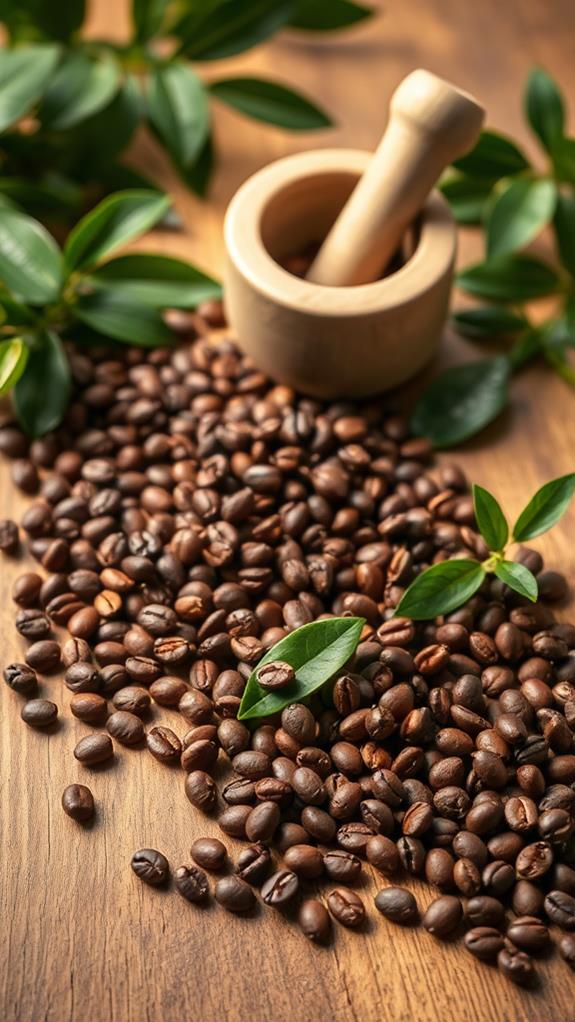
Several potential health benefits come with eating coffee beans. When you consume whole beans, you're getting a concentrated dose of antioxidants, particularly chlorogenic acid. This compound has been linked to various health advantages, including improved blood sugar control and reduced inflammation. Like cacao butter, coffee beans can be a source of healthy fats and may contribute to overall wellness when consumed in moderation.
Eating coffee beans may offer these benefits:
- Enhanced cognitive function and alertness
- Increased metabolic rate, potentially aiding in weight management
- Improved physical performance during exercise
- Reduced risk of certain chronic diseases, such as type 2 diabetes
It's important to note that while these benefits are promising, more research is needed to fully understand the effects of eating coffee beans versus drinking brewed coffee. The higher caffeine content in whole beans means you'll need to be mindful of your intake to avoid potential side effects like jitters or insomnia.
Additionally, the fiber content in whole coffee beans may contribute to digestive health, though excessive consumption could lead to gastrointestinal discomfort. As with any dietary change, it's wise to start with small amounts and observe how your body responds before incorporating coffee beans regularly into your diet.
Digestive System Impact
Chewing on whole coffee beans can kick off a range of digestive reactions in your body. When you consume coffee beans directly, you're ingesting a concentrated form of caffeine and other compounds. This can lead to faster absorption of these substances compared to drinking brewed coffee. Your stomach might experience increased acid production, potentially causing discomfort or heartburn for some individuals. Similar to chocolate's expiration date, the quality and safety of coffee beans can vary depending on storage conditions and time.
The high fiber content in coffee beans can also impact your digestive system. While fiber is generally beneficial for digestion, consuming too many coffee beans might lead to bloating or gas. Additionally, the beans' rough texture could irritate your esophagus and stomach lining if eaten in large quantities.
It's worth noting that coffee beans contain compounds called diterpenes, which can affect cholesterol levels. These substances are largely filtered out during brewing but remain present when eating whole beans. Your liver processes these compounds, potentially influencing lipid metabolism. As with any food, moderation is key. If you're considering incorporating coffee beans into your diet, it's advisable to start with small amounts and monitor your body's response.
Risks and Side Effects
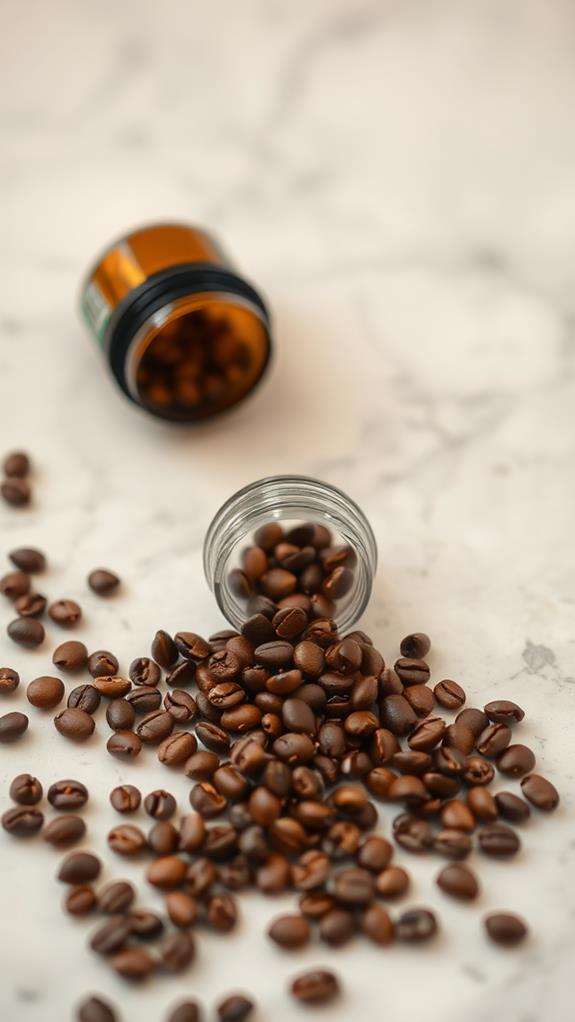
Consuming whole coffee beans carries potential risks and side effects that you should consider. While eating coffee beans isn't inherently dangerous, it can lead to more intense effects than drinking brewed coffee.
Some risks and side effects include:
- Increased caffeine intake, potentially causing jitters, anxiety, or insomnia
- Digestive discomfort, such as stomach upset or acid reflux
- Dental issues due to the beans' hardness and acidity
- Higher exposure to compounds like acrylamide in dark-roasted beans
You'll likely experience a stronger caffeine buzz when eating coffee beans directly. This can lead to heightened alertness but also increased heart rate and blood pressure. If you're sensitive to caffeine or have certain health conditions, you should be cautious.
The beans' oils and acids might irritate your stomach lining, causing discomfort or exacerbating existing digestive issues. Additionally, chewing on hard coffee beans could damage your tooth enamel or dental work over time.
Lastly, be aware that consuming large quantities of coffee beans might interfere with nutrient absorption or medication effectiveness. It's always best to consult with a healthcare professional if you have concerns about incorporating coffee beans into your diet.
Raw Vs Roasted Beans
The choice between raw and roasted coffee beans presents two distinctly different eating experiences. Raw coffee beans, often called green beans, have a grassy, earthy flavor and are considerably harder to chew. They contain higher levels of chlorogenic acid, an antioxidant that's partially lost during roasting. However, raw beans can be more difficult to digest and may cause stomach upset in some people.
Roasted beans, on the other hand, offer the familiar coffee flavor you're accustomed to in your morning brew. The roasting process breaks down some of the beans' complex sugars and oils, creating the rich, aromatic compounds that coffee lovers crave. Roasted beans are also easier to chew and digest. They're available in various roast levels, from light to dark, each imparting unique flavor profiles.
When it comes to caffeine content, there's a common misconception that darker roasts contain more caffeine. In reality, the roasting process slightly reduces caffeine levels, making lighter roasts marginally more caffeinated by volume. However, the difference is minimal and unlikely to noticeably impact your caffeine intake when consuming whole beans.
Recommended Consumption Amounts
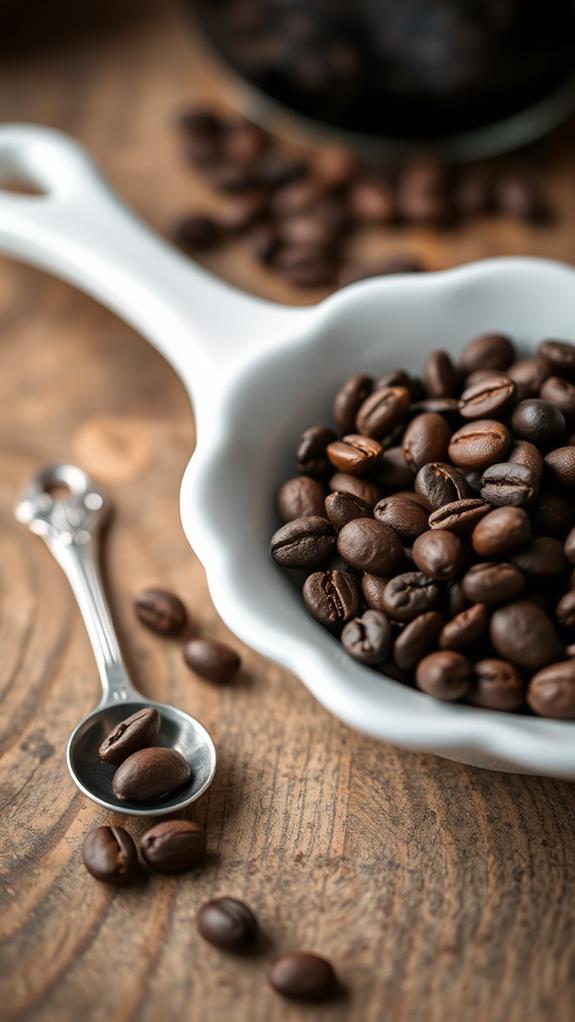
When it comes to eating coffee beans, you'll want to follow some daily intake guidelines to ascertain you're not overdoing it. As a general rule, experts recommend consuming no more than 400 mg of caffeine per day, which translates to about 20-30 whole coffee beans. Remember, moderation is key, as excessive consumption can lead to side effects like jitters, insomnia, and digestive issues.
Daily Intake Guidelines
For safe consumption of coffee beans, it is imperative to follow recommended daily intake guidelines. While eating coffee beans isn't harmful in moderation, excessive consumption can lead to unpleasant side effects. The caffeine content in whole beans is more concentrated than in brewed coffee, so you'll need to adjust your intake accordingly.
As a general rule, limit your coffee bean consumption to no more than 1-2 ounces (28-56 grams) per day. This amount roughly equates to the caffeine found in 1-2 cups of brewed coffee. However, individual tolerance levels may vary, so it is paramount to listen to your body and adjust as needed. Start with small amounts and gradually increase if desired, monitor your body's response, including sleep patterns and energy levels, consider your overall caffeine intake from other sources, and consult with a healthcare professional if you have any concerns or pre-existing conditions.
Remember that coffee beans contain other compounds besides caffeine, such as antioxidants and fiber. While these can offer health benefits, they may also cause digestive issues in some people when consumed in large quantities. By following these guidelines, you'll be able to enjoy coffee beans safely and reap their potential benefits without overdoing it.
Moderation Is Key
Building on the daily intake guidelines, it's important to understand that moderation is the cornerstone of safe coffee bean consumption. While enjoying coffee beans can be a delightful experience, you shouldn't overindulge. A recommended serving size is about 30 whole coffee beans, which is roughly equivalent to one shot of espresso. This amount provides a balance between flavor enjoyment and caffeine intake.
You'll want to limit your consumption to no more than 400 mg of caffeine per day, which translates to about 160 whole coffee beans. Keep in mind that this limit includes caffeine from all sources, not just coffee beans. If you're new to eating coffee beans, start with smaller amounts and gradually increase your intake to assess your tolerance. Pay attention to how your body reacts, as individual sensitivity to caffeine can vary. Some people may experience jitters, anxiety, or digestive discomfort with even small amounts. By practicing moderation, you'll be able to enjoy the unique taste and potential benefits of coffee beans without risking adverse effects associated with excessive caffeine consumption.
Alternatives to Eating Whole Beans
If you're not keen on eating whole coffee beans, you've got other options to enjoy that coffee flavor. Flavored coffee-infused snacks, like chocolate-covered espresso beans or coffee-flavored energy bars, can give you a similar taste experience. Another alternative is to incorporate ground coffee into your recipes, adding it to baked goods, marinades, or even spice rubs for meats.
Flavored Coffee-Infused Snacks
Creativity in the coffee industry has led to a plethora of coffee-infused snacks for those who crave the flavor without munching on whole beans. You'll find an array of options that incorporate coffee's rich taste into convenient, bite-sized treats. These snacks often use coffee as a key ingredient, infusing its flavor profile into familiar formats.
Some popular coffee-infused snacks include:
- Chocolate-covered espresso beans
- Coffee-flavored energy bars
- Tiramisu-inspired cookies
- Coffee-rubbed beef jerky
When selecting coffee-infused snacks, consider the caffeine content, as it can vary extensively between products. Manufacturers often use different methods to incorporate coffee flavor, such as using extracts, ground beans, or brewed coffee in their recipes. These techniques can affect both taste and caffeine levels.
For those concerned about search engine optimization (SEO), incorporating coffee-related keywords into product descriptions can improve visibility. Terms like "artisanal coffee snacks" or "gourmet coffee-infused treats" can help attract potential customers searching for unique coffee experiences. By offering these alternative coffee-flavored options, you're catering to a growing market of coffee enthusiasts seeking diverse ways to enjoy their favorite beverage.
Ground Coffee in Recipes
While coffee-infused snacks offer a convenient way to enjoy coffee flavors, ground coffee in recipes provides a more versatile approach to incorporating the rich taste of coffee into your culinary creations. You can use ground coffee in both sweet and savory dishes, adding depth and complexity to your meals. For baked goods, try adding a tablespoon or two of finely ground coffee to chocolate cake or brownie batter. This will enhance the chocolate flavor and create a subtle coffee undertone.
In savory dishes, ground coffee can be used as a rub for meats, particularly beef or pork. Mix it with other spices like paprika, garlic powder, and brown sugar for a flavorful crust. You can also add ground coffee to marinades or sauces for an extra layer of flavor. When using ground coffee in recipes, opt for a fine grind to guarantee even distribution and avoid any grainy texture. Start with small amounts and adjust to taste, as coffee's intensity can vary. Remember, using ground coffee in recipes allows you to manage the coffee flavor without consuming whole beans directly.
Frequently Asked Questions
Can Eating Coffee Beans Stain Your Teeth?
Yes, eating coffee beans can stain your teeth. They contain tannins, which are compounds that can discolor your enamel. When you chew coffee beans, you're exposing your teeth to these staining agents more directly than when drinking coffee. The concentrated form of coffee in whole beans can lead to more intense staining. If you're concerned about tooth discoloration, it's best to limit your consumption of coffee beans and maintain good oral hygiene practices.
Are There Different Flavors of Edible Coffee Beans?
Yes, you'll find various flavors of edible coffee beans. From fruity to floral, these beans boast diverse tastes. You can enjoy chocolate-covered espresso beans, flavored with vanilla, caramel, or hazelnut. Some companies offer specialty roasts with unique profiles like cinnamon or coconut. Remember, the bean's origin, roasting process, and any added flavors contribute to its taste. When trying different varieties, you'll notice subtle differences in acidity, body, and aroma. Explore these options to find your favorite flavor profile.
How Long Do Roasted Coffee Beans Stay Fresh for Eating?
You'll find that roasted coffee beans stay fresh for eating about 2-3 weeks after roasting. However, they're at their peak flavor within the first 7-10 days. After that, they'll gradually lose their complexity and aroma. To maximize freshness, store your beans in an airtight container away from light, heat, and moisture. If you've bought pre-roasted beans, check the roast date on the package. For the best eating experience, consume them within a month of that date.
Can You Eat Coffee Beans While Pregnant?
Imagine you're a pregnant coffee lover, craving those crunchy beans. While it's generally safe to eat coffee beans during pregnancy, you should be cautious. You'll want to limit your caffeine intake to 200mg daily, as recommended by health experts. That's about 2-3 cups of coffee or 30-50 coffee beans. Remember, caffeine can affect your baby's development, so it's best to consult your doctor before indulging. They'll help you make the safest choice for you and your little one.
Are There Any Age Restrictions for Eating Coffee Beans?
There aren't specific age restrictions for eating coffee beans, but you should consider a few factors. Young children and teens might be more sensitive to caffeine's effects, so it's best to limit their intake. For adults, moderation is key. If you're pregnant or have certain health conditions, consult your doctor before consuming coffee beans. Remember, coffee beans contain more caffeine than brewed coffee, so be mindful of your overall caffeine consumption to avoid potential side effects like jitters or sleep disturbances.
Conclusion
While eating coffee beans is generally safe, you'll want to approach it with caution. Like a double-edged sword, the concentrated caffeine can provide a quick energy boost but may also lead to jitters or digestive issues. Stick to small amounts of roasted beans, and avoid raw ones. If you're looking for coffee's benefits without the risks, consider alternatives like brewed coffee or coffee-flavored foods. Always listen to your body and consult a doctor if you have concerns.
